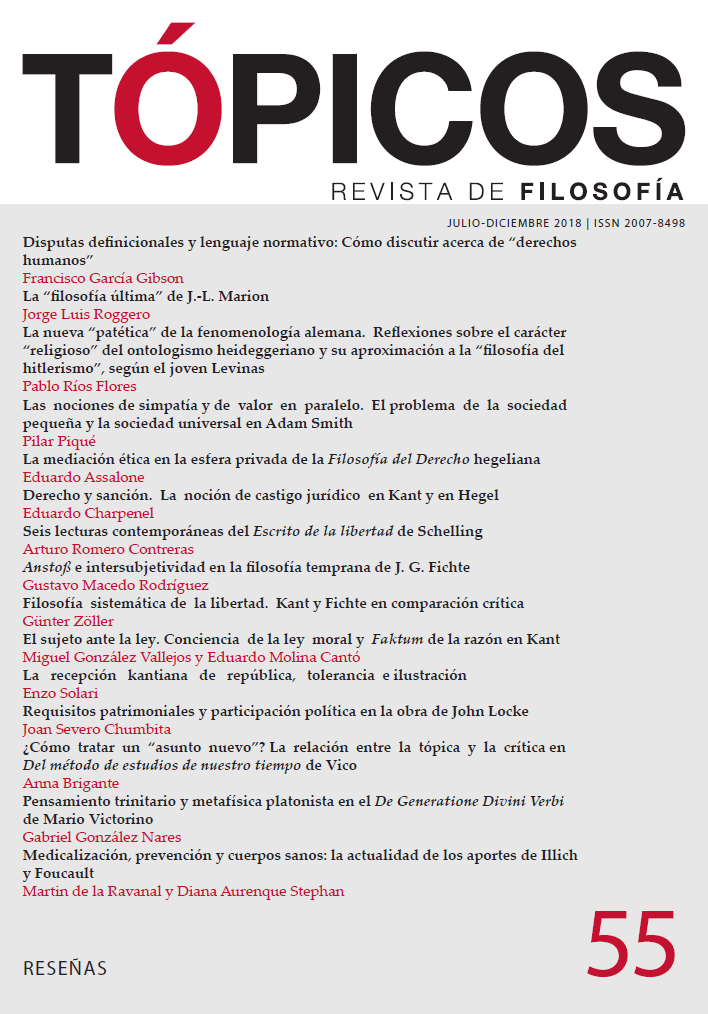Publicado 2018-06-08
Palabras clave
- disputa definicional,
- derechos humanos,
- emotivismo
Cómo citar
Resumen
Las disputas definicionales sobre términos normativos son frecuentes. ¿Vale la pena disputar sobre meras palabras? Sostengo que ganar una disputa definicional tiene efectos prácticos importantes. Imponer una definición particular de un término normativo sobre otros hablantes puede causar en ellos ciertas emociones deseables, o puede influir sobre su interpretación de aquellas reglas jurídicas o morales cuya formulación incluye el término disputado. Luego describo dos modalidades retóricas mediante las cuales los disputantes pueden proponer su definición preferida: una modalidad que presenta la propuesta como si fuera una descripción de un hecho sobre la comunidad lingüística y otra modalidad que presenta la propuesta como una prescripción lingüística. Muestro que debe adoptarse el segundo modo, porque (entre otras razones) es más transparente con respecto a las razones por las cuales disputamos sobre palabras. El trabajo ilustra el punto con el caso de la disputa sobre el término “derechos humanos”.
Referencias
- Ayer, Alfred Jules. 2014. Language, Truth and Logic. New York: Dover Publications.
- Beitz, Charles R. 2009. The Idea of Human Rights. Oxford: Oxford University Press.
- Burgess, Alexis, and David Plunkett. 2013. “Conceptual Ethics I.” Philosophy Compass 8 (12): 1091–1101.
- Gallie, W. B. 1955. “Essentially Contested Concepts.” Proceedings of the Aristotelian Society 56: 167–98.
- Griffin, James. 2008. On Human Rights. Oxford; New York: Oxford University Press.
- Hare, Richard Mervyn. 1952. The Language of Morals. Oxford: Oxford University Press.
- Meckled-Garcia, Saladin. 2008. “Moral Methodology and the Third Theory of Rights.” School of Public Policy Working Paper Series. Accesible en: ttps://www.ucl.ac.uk/spp/research/publications/downloads/spp-wp-28.pdf.
- Meckled-Garcia, Saladin. 2013. “Giving Up the Goods: Rethinking the Human Right to Subsistence, Institutional Justice, and Imperfect Duties.” Journal of Applied Philosophy 30 (1): 73–87.
- O’neill, Onora. 2000. Bounds of Justice. Cambridge: Cambridge University Press.
- Plunkett, David, and Timothy Sundell. 2013. “Disagreement and the Semantics of Normative and Evaluative Terms.” Philosophers’ Imprint 13 (23).
- Stevenson, Chares L. 1944. Ethics and Language. New York: Yale University Press.
- Tasioulas, John. 2007. “The Moral Reality of Human Rights.” En Freedom from Poverty as a Human Right: Who Owes What to the Very Poor, edited by Thomas Pogge. Oxford: Oxford University Press.






